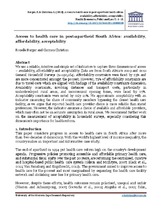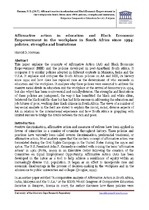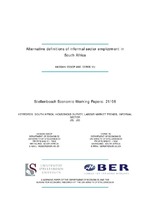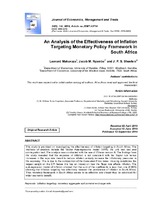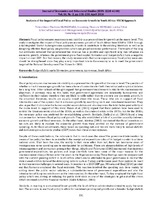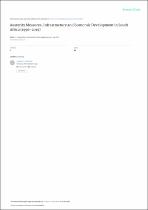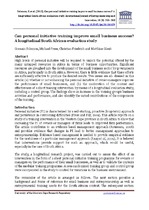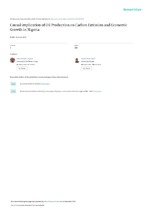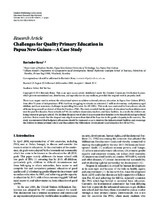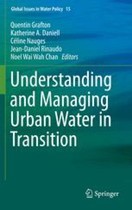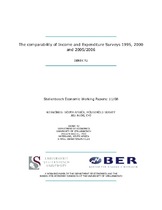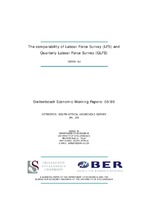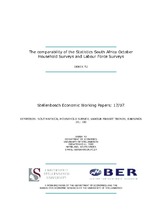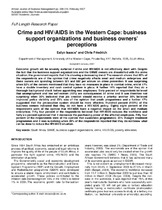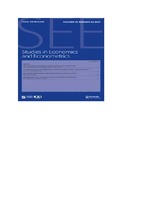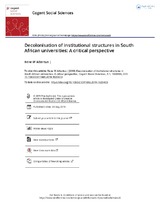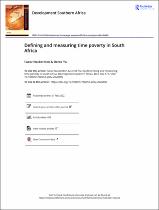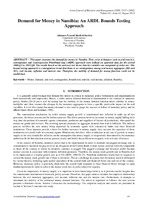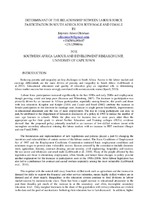Browsing Research Publications by Title
Now showing items 1-20 of 120
-
Access to health care in post-apartheid South Africa: availability, affordability, acceptability
(Cambridge University Press, 2018)We use a reliable, intuitive and simple set of indicators to capture three dimensions of access – availability, affordability and acceptability. Data are from South Africa’s 2009 and 2010 General Household Surveys (n=190,164). ... -
Affirmative action in education and Black Economic Empowerment in the workplace in South Africa since 1994: policies, strengths and limitations
(BCES Conference Books, 2017)This paper explains the concepts of Affirmative Action (AA) and Black Economic Empowerment (BEE) and the policies developed in post-Apartheid South Africa. It compares it to similar policies adopted in different contexts ... -
Alternative definitions of informal sector employment in South Africa
(Stellenbosch University, 2008)Before the introduction of the Quarterly Labour Force Survey (QLFS) in 2008, Statistics South Africa (Stats SA) has been using the same methodology to derive the informal sector employment throughout the years, focusing ... -
An analysis of the effectiveness of inflation targeting monetary policy framework in South Africa
(Journal of Economics, Management and Trade, 2019)This study is premised on investigating the effectiveness of inflation targeting in South Africa. The methods of analysis include the Vector Autoregressive model (VAR), the unit root test and cointegration test. The ... -
Analysis of the Impact of Fiscal policy on economic growth in South Africa: VECM approach
(2018)Fiscal policy ensures macroeconomic stability as a precondition for growth at the macro level. This study investigates the impact of fiscal policy on economic growth of South Africa from 1960 to 2014 through a Cointegrated ... -
Austerity measures, infrastructure and economic development in South Africa (1996–2019)
(Vilnius University Press, 2023)The paper aims to establish whether austerity measures promote economic development, improve infrastructure development, and whether they exacerbate infrastructure backlogs. The methodology used is a quantitative research ... -
Can personal initiative training improve small business success? A longitudinal South African evaluation study
(Sage Publications, 2013)High levels of personal initiative will be required to unlock the potential offered by the many untapped resources in Africa in terms of business opportunities. Significant resources are ploughed into the development of ... -
Casual implication of Oil Production on Carbon Emission and Economic Growth in Nigeria
(Opole University, 2016)The paper investigated the causality among carbon emission, oil production and economic growth in Nigeria’s time series data for the period 1970 to 2013. It estimated an autoregressive distributed lag model and used granger ... -
Causal implication of oil production on carbon emission and economic growth in Nigeria
(Opole University, 2016)The paper investigated the causality among carbon emission, oil production and economic growth in Nigeria’s time series data for the period 1970 to 2013. It estimated an autoregressive distributed lag model and used granger ... -
Challenges for quality primary education in Papua New Guinea — a case study
(Hindawi Publishing Corporation, 2011)There is an urgent need to reform the educational system to achieve universal primary education in Papua New Guinea (PNG). Even after 35 years of independence, PNG has been struggling to educate an estimated 2 million ... -
The challenges of providing water and sanitation to urban slum settlements in South Africa
(Springer, 2015)Although the South African government has, since democratic transition, made considerable progress in providing water and sanitation, there are still many challenges, particularly in slum settlements where many residents ... -
The comparability of income and expenditure surveys 1995, 2000 and 2005/2006
(Stellenbosch University, 2017)The Income and Expenditure Survey (IES) conducted by Statistics South Africa (Stats SA) between September 2005 and August 2006 was the third of its kind, after similar surveys in October 1995 and October 2000. The main ... -
The comparability of labour force survey (LFS) and quarterly labour force survey (QLFS)
(Stellenbosch University, 2009)Statistics South Africa (Stats SA) has been collecting labour market data since 1993 with the October Household Survey (OHS), which was conducted annually between 1993 and 1999, as well as the Labour Force Survey (LFS), ... -
The comparability of the statistics South Africa October household surveys and labour force surveys
(Stellenbosch University, 2017)Statistics South Africa (Stats SA) has been collecting labour market data with household surveys and in a fairly comparable format since 1993. These datasets have been studied and compared extensively in order to better ... -
Crime and HIV/AIDS in the Western Cape: business support organizations and business owners' perceptions
(Academic Journals, 2007)Economic growth will be severely curtailed if crime and HIV/AIDS is not effectively dealt with. Despite the fact that the business support organizations and the SMME owners are dissatisfied with the crime situation, the ... -
Cyclicality of size, value, and momentum on the Johannesburg Stock Exchange
(Taylor & Francis, 2021)The study examines the cyclical behaviour of style premiums on the Johannesburg Stock Exchange (JSE) over the period 2002–2018. More specifically, the study establishes whether there is a contemporaneous relationship between ... -
Decolonisation of institutional structures in South African universities: A critical perspective
(Cogent OA, 2019)In 2015, using social media, a new generation of South African university students launched the social justice movement #FeesMustFall. The call for social justice, equity and equality has been a burning issue in ... -
Defining and measuring time poverty in South Africa
(Routledge, 2023)This study primarily adopted the absolute approach to examine time poverty in South Africa by analysing the 2000 and 2010 Time Use Survey data. The findings indicated that absolute time-poor individuals were predominantly ... -
Demand for money in Namibia: An ardl bounds testing approach
(Asian Online Journals, 2013)This paper examines the demand for money in Namibia. Time series techniques such as unit root test, cointegration and Autoregressive Distributed Lag (ARDL) approach were utilized on quarterly data for the period 2000:Q1 ... -
Determinant of the relationship between labour force participation in South Africa for both male and female
(University of Cape Town, 2016)Reducing poverty and inequality are key challenges in South Africa. Access to the labour market and earnings differentials are the main drivers of poverty and inequality in South Africa (Leibbrandt et al.,2010). Educational ...

